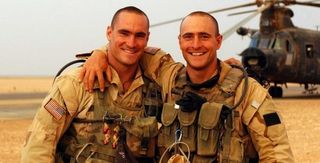Exclusive Interview: The Tillman Story Director Amir Bar-Lev

Hitting theaters this weekend in limited release, amid the dregs of summer blockbusters, is a truly astonishing film. Amir Bar-Lev's documentary The Tillman Story, which premiered earlier this year, chronicles the short-lived military career of former NFL player Pat Tillman and his death in Afghanistan, which was deliberately painted as an act of heroism by a military well aware that he'd died from friendly fire instead. Through interviews with the Tillman family and the military Bar-Lev meticulously deconstructs the media myth built up around Tillman, and the very notion that any young man's death in a war can be a simple act of valor, or even simply explained.
It's a documentary well worth anyone's time, if nothing else than for the experience of getting to know the Tillman family, a foul-mouthed and loving crew who defend their brother and son and husband's memory while also fiercely guarding his privacy. When I talked to him in Manhattan last week Bar-Lev said it was a challenge to even get the Tillman family's participation, but from there the even tricker part was putting the story together, condensing the immense amount of information and keeping focus on a central character-- Pat Tillman himself-- who is now simply a ghost. Read below for the insight Bar-Lev had about his working process, why he changed the film's original title before Sundance, and his conviction that The Tillman Story is not merely a phenomenon of the Bush administration or the Afghanistan war, but a mythmaking and coping process that has existed through all wars.
The film's original title was I'm Fucking Pat Tillman. Did you ever really think you'd be able to keep it? Yeah, I did. I'm kind of naive that way. I love that title, [but] it would severely limit the audience for the film. The other thing is, as we began to see, people kept thinking the film was called I'm Fucking Pat Tillman [emphasis on "fucking"]-- like a Sarah Silverman thing. So that was problematic. The thing about this particular film is it's a once-in-a-lifetime opportunity to possibly reach an audience that doesn't normally go for documentaries, and engage them in a conversation on things, a conversation that's not normally engaged upon. We didn't want to make a film that would be easily written off as a polemic of one kind or another. Calling the film I'm Pat Fucking Tillman, it just would have limited the film's distribution.
You say you don't want it to be a polemic, but you don't really try to take it from the perspective of anyone but the family. Was that your goal, or a result of not having access to the government talking heads? How did that balance emerge?
If I'd had conversations with people who caused me to question the family's position, I think-- this is very hypothetical-- but I think I would have taken the film in that direction. The bottom line is I sympathize with the family, and I haven't heard any compelling counter-arguments to them. It isn't that nobody would speak--
[Our conversation is interrupted, no joke, by a phone call from Pat's mother Danni. He doesn't answer it]
I'm sort of unabashedly in the family's camp. I think that filmmakers are allowed to have an opinion. What I aspire to as a filmmaker is to let my opinion be in my films, but to leave room for my audience to disagree if they want.
CINEMABLEND NEWSLETTER
Your Daily Blend of Entertainment News
You could have delved into more focus on the government and their other cover-ups like the Jessica Lynch story, or even the psychology behind friendly fire. How did you avoid those tangents?
It was absolutely a nightmare. We edited for a year. A huge amount of the budget went to the edit. There's heartbreakingly interesting things that ended up on the cutting room floor. We had to really triage. We chose an unconventional narrative structure. And I really love our narrative structure. Basically we wanted to have the film basically begin and end at his death. I was trying to borrow from a Tarantino kind of thing, where you've got these different characters, and you see how that memorial service was a seminal moment in all these peoples' lives. Once Pat dies the third time [when the story is explained for the third time]at that point you the audience are ready for the film to be over. And even at that point we weren't ready to end the film, because we still had to do the Congressional hearings and all that stuff. But it cause us to shear off tons of things that are very interesting.
Pat is the central figure of the film--
Is he though? Pat actually isn't. He's kind of a ghost.
That's kind of my point-- the point of the movie seems to be that you can't know him. You've got this figure who you don't really want the audience to fully know. That's a daring thing to do.
I hope you do get to know him. We wanted you to get a strong sense for the guy, but we didn't want to deconstruct him. We didn't want to violate his privacy. His family is extremely private-- they didn't want to make the film to begin with. We had to really convince them. For instance, on his enlistment, he had asked for privacy and was very deliberate about not granting interviews, and they weren't going to betray that, now or ever. This very important part of his biography was a secret to us. You have two problematic choices-- are you going to deny your audience something, or are you going to betray the dead man you're honoring? We tried to make a film that gives you some sense of him but doesn't pretend to dissect him.

The family members never break down in their interviews, no matter how emotional the stuff they're talking about is. A lot of people could see that and assume they don't care. You get it across in the movie that they do care, but that seems like a challenge to present.
Richard [Tillman, Pat's brother and interview subject in the film] said no to us also at first. We finished the film and Richard watched it and said, "I regret saying no to you." So we said, "Get on a plane." We put him on a red eye. He's totally integral. One of the things he said in the interview, also not in the film-- I asked about Kevin's [another Tillman brother who also served in Afghanistan with Pat] reticence to be on camera. He said, "Kevin wasn't hiding under a fucking rock." Kevin spoke to his friends, he spoke to his family, he grieved with the people who are close to him. This is a family that really gets something that the rest of us are quickly forgetting, about privacy. We just live in this moment in time when everybody thinks everything it's everybody's business. This family just never bought into that. It's not old-fashioned values, it's six-years-ago values.
The timing of this film is interesting, because it would be easy to see this story as a relic of the Bush era.
I really hope that it isn't seen as a relic of the Bush era. I think people are really kidding themselves is they think the Tillman story is about the Bush administration. It's a deliberate thing that people will do. People are letting themselves off the hook if they think it's about the Bush administration. And it's not about Pat Tillman. For the family, it's definitely not about Pat Tillman. As [Danni Tillman] says at the end of the film, "It's not about Pat. We'll never get Pat back. This is about what we're owed by our elected leaders." And this sort of thing has been going on long before the Bush administration, or before America. It's about the lies we tell ourselves to make war palatable. And it's from the Greek times-- heroes, hero worship, valorizing war and telling lies about it.
And it's fair to assume that something along these lines is happening still today.
That's what it's all about for the family-- who's the next Pat Tillman? Danni Tillman gets calls all the time from moms and widows who have had similar things happen to them. She's not asking for special attention to Pat. She understands that because he's a celebrity and we're a celebrity-obsessed culture, she can do things these other people can't. She's doing us a favor by holding our leaders accountable in a way others can't.
Staff Writer at CinemaBlend
Most Popular






